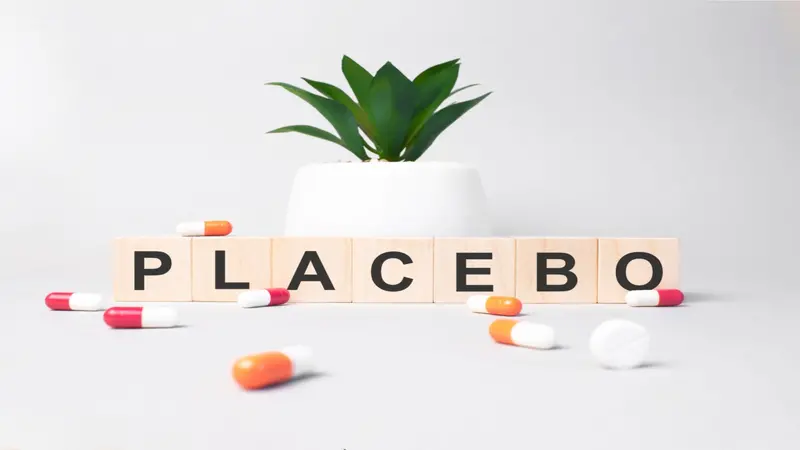

WELLthier Living and Aging

WELLthier Living and Aging
How Do Placebos Really Work?
The placebo effect shows how powerful the mind–body connection can be. It happens when a person experiences real symptom relief from something that has no active medical ingredient, like a sugar pill or saline injection. This phenomenon isn’t “just in your head”; placebos can trigger real changes in the brain, releasing feel-good chemicals like endorphins and dopamine. These changes can affect how we perceive pain, stress, and discomfort. Placebos are especially helpful for symptoms the brain can modulate, such as pain, fatigue, nausea or stress-related insomnia.
The effect isn’t only about belief. The ritual of care—going to a clinic, taking a pill, or receiving attention—can itself send signals to the brain that promote healing.
The Real Definition of Placebo
Many people understand a placebo as a fake treatment has no real medical effect. People often think of it as something used to trick participants in clinical trials to see if a real drug works better.
In this common view, any improvement after taking a placebo is often attributed to the person imagining they feel better, rather than their body actually responding in a measurable way. Many assume the placebo effect is purely psychological—tied to belief or gullibility—rather than involving real biological changes.
However, while it is true that placebo treatments are often used as the control in clinical trials, there is more to the placebo effect than meets the eye. Growing scientific evidence shows that placebos can activate real physiological pathways.
As Fabrizio Benedetti and colleagues explain in the European Journal of Psychotraumatology,
Placebo effects arise from the interaction of expectations, context, and meaning. These factors can activate the same biological pathways as active drugs—such as endogenous opioids, endocannabinoids, and dopamine—producing measurable physiological outcomes. While placebo responses are often shorter in duration and more variable than those of active drugs, they can sometimes match drug efficacy, especially for pain and mood-related conditions.
Context Matters
A variety of factors influence how the body responds to a placebo treatment.
When the placebo is administered as a pill, its size, shape, quantity, brand, and even color can impact how effective the medication is perceived to be. This, in turn, influences the brain’s biological response to the placebo.
Furthermore, factors like the patient’s trust in their doctor as well as the cultural and clinical context where treatment is received can generate different responses to placebo.
Remarkably, placebos can still work even when patients know the treatment is inert. This phenomenon is known as an “open-label” placebo. In these cases, the treatment is openly described as a placebo rather than disguised as a real medication. A systematic review of five clinical trials found that open-label placebos improved symptoms in conditions such as back pain, depression, allergic rhinitis, irritable bowel syndrome IBS), and attention-deficit/hyperactivity disorder (ADHD). These effects are thought to occur through positive expectation (the brain releasing healing chemicals like endorphins) and conditioning (our learned response to medical care from trusted providers).
Patient Type and Disease Type Influence Placebo Response
Some types of people respond to placebo treatment more readily than others. Personality traits like optimism, suggestibility, and empathy tend to enhance placebo effects. Conversely, high anxiety can trigger a “nocebo” response, wherein negative expectations or beliefs about a treatment cause a person to experience real, harmful or unpleasant symptoms even when the treatment itself is inactive or harmless. Emerging research also indicates that neuroimaging can identify biomarkers that predict who will respond to placebos.
In addition, some medical conditions are more responsive to placebo than others. For example, in post-traumatic stress disorder (PTSD), placebo response rates are notably high, even though the underlying mechanisms remain understudied.
The Physiology of Placebo
The placebo effect includes a measurable response in the body, not just a perception of feeling better. Placebos can activate the same neurochemical systems as active treatment drugs such as opioid and endocannabinoid pathways for pain, or dopamine pathways for Parkinson’s disease. Although placebo effects tend to be shorter in duration and more variable than those of drugs, they can sometimes match drug efficacy in terms of magnitude.
Some biological pathways seem to be consistent across contexts. Certain brain regions, such as the prefrontal cortex, amygdala, nucleus accumbens, and ventral striatum, are consistently involved in placebo responses, especially those related to pain modulation.
The Bigger Picture
Placebos show that healing is not solely about drugs or procedures; it is about the meaning, context, and expectations surrounding treatment. From open-label placebos to complex psychosocial rituals, the mind has the power to trigger real physiological changes that can relieve symptoms and improve well-being. Understanding and ethically harnessing these effects could transform patient care, making empathy, communication, and trust as essential as the treatments themselves.
REFERENCES
Benedetti, F., Piedimonte, A., & Frisaldi, E. (2018). How do placebos work?. European journal of psychotraumatology, 9(Suppl 3), 1533370. https://doi.org/10.1080/20008198.2018.1533370
HealingWorks Foundation. (2018, May 18). Understanding the value of the placebo effect. HealingWorks Foundation. https://healingworksfoundation.org/understanding-power-placebo-effect/ Healing Works Foundation
Harvard Health Publishing. (2024, July 22). The power of the placebo effect. Harvard Health. https://www.health.harvard.edu/newsletter_article/the-power-of-the-placebo-effect Harvard Health
Oxford Primary Health Care Blog. (2017, May 5). Placebos work even when patients know what they are. PHC Oxford. https://www.phc.ox.ac.uk/blog/placebos-work-even-when-patients-know-what-they-are


 By
By






